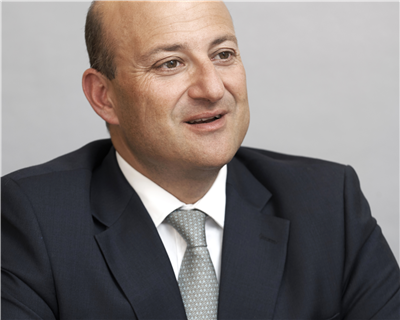ECA Interview: UKEF sharpens its tools
UK Export Finance’s chief executive, Louis Taylor, tells TXF how the export credit agency is broadening its product suite to offer more support to UK exporters.

~UK Export Finance^’s chief executive, Louis Taylor, tells TXF how the export credit agency is broadening its product suite to offer more support to UK exporters.
Trade & Export Finance (TXF): Louis, you were appointed as UKEF’s new CEO in October. Upon joining, what were your key goals for where you wanted to take the organisation?
Louis Taylor (LT), chief executive of UK Export Finance (UKEF): One of the best legacies of my predecessor was that he had articulated the strategy very well, but I think the important thing about a strategy is less the definition and more the execution. And so my ambition really is about ensuring that we execute the strategy very well, with a bit of passion and energy, broadening and deepening the fulfilment of the mission we have. That mission I think we have clarified a bit, namely to ensure that no viable UK export fails for want of finance or insurance from the private sector, and to do that at no net cost to the taxpayer.
I joined at a particularly exciting time because our powers had recently been expanded through statute and we have the opportunity to broaden out the product mix. So we have seen quite a lot innovation in that regard: some Sharia-compliant Islamic financing and support for loans in some more exotic currencies – offshore renminbi is not particularly exotic these days but still it was a first for a European ECA.
We also need to be very much embedded earlier on in the bidding process with the customers we support. So we need to be helping customers win bids, not just to fulfil contracts once they have been won, and that involves us being a little bit more proactive. That means getting in touch with people at an early stage when they are bidding for things, rather than being a kind of lender of last resort and waiting for them to come to us. That just isn’t going to cut it.
The important thing is that whilst we don’t have an asset target or an income target, people need to know that we are not there chasing our market share, we are helping them to achieve their market share. And the private sector shouldn’t feel threatened by us. We are still there to complement and not compete. But we might be able to help people earlier on even if the result of that is to sharpen the private sector’s pencil. That would be a good result for British exports as well.
TXF: Now that you’ve had a few months in the role, what additional areas have you earmarked as in need of further development?
LT: I think that we can do more on the innovation side. So we talked a little about the Sharia-complaint financing and the renminbi loan, but there are other gaps in the market that we can fill. I think we need to take that innovative approach with all our customers. We need to help them to identify opportunities to export and to realise those opportunities in a better way. So we need to be more flexible on how we can respond to business cycles.
Take aviation. At the height of the crisis we were financing a significant portion of Airbus deliveries. At the moment the private market is very, very liquid for aircraft and the proportion of deliveries we are financing is very much lower. However, that simply demonstrates that there is a cycle. We are creating internal flexibility, making sure we have broad experience as well as some depth amongst our mid and junior-level staff, so that as peaks and troughs occur in different industries we are able to respond to market demand.
TXF: You’ve come from a successful career at Standard Chartered, much of which was focussed on South-East Asian countries. Do you think the region offers much potential business for UK exporters?
LT: The Prime Minister went on a trade mission to South-East Asia last summer and that was no accident. There are absolutely opportunities in the region for UK exporters. ASEAN is a community of 600 million people, with massively rising consumer opportunities and demographics that are really very exciting in places like Indonesia, Vietnam and the Philippines particularly.
We ourselves facilitated exports last year to Indonesia, Malaysia, Thailand, Vietnam and Singapore. The other thing we can do is to look at local currencies. We are very happy to look at ringgit in Malaysia, baht in Thailand, rupiah in Indonesia, Hong Kong dollars, Taiwan dollars as well. So there are many currencies that we can help finance in local terms for the purchase of British exports. Islamic-compliant financing is also relevant in Indonesia and Malaysia. Islamic financing is a growing part of their economies, and our capability there may well help swing things in favour of British exporters.
TXF: In September, UKEF signed a significant agreement with GE that could see up to £12 billion worth of support for new UK investment and exports out of the country. Are we likely to see this cooperative model rolled out to other multinationals, or is this just a one-time thing?
LT: That was a really important deal for the UK, for UK production. GE has decided to headquarter its oil and gas business here in the UK, and that comes with a commitment to increase the UK supply into that business, at a time when our oil and gas related industry is hitting a tricky time as the North Sea is less economic at under $30 a barrel. So keeping that industrial capability really depends on exports and having GE here, because they can see a reliable through-the-cycle export credit agency that is going to help them develop oil and gas fields. We have already managed to sign and complete on a significant transaction for Petrobras, for example, where they have a facility of $500 million to purchase GE products out of the UK.
The opportunity of the MoU came about and we absolutely took it. But it doesn’t mean that we don’t cover other major exporters in a similar way. We have a phenomenal relationship with Rolls Royce, for example. Airbus is obviously a big exporter out of the UK, but we work with Siemens and Caterpillar as well, so there are some major exporters that we are already coordinating very closely with.
TXF: Last year saw UKEF debut its first direct loan to an overseas buyer, its first guarantee on a Renminbi loan, and the world’s first ECA-backed sukuk. What surprises have you got in store for us this year? Where next for the expanding UKEF product suite?
LT: I can’t talk too specifically about individual activities and transactions that are coming up. But let’s take Iran, for example. Sanctions, to an extent, were lifted on Iran a number of weeks ago and from the moment they were lifted we announced that we were back on cover for British exporters exporting to Iran. And I think you should look out for the first transaction that gets done there. The Airbus announcement last month is pretty exciting and we would expect to be pretty integrally involved in all of that.
We are leading the ECA community in that regard. Being on cover from day one of sanctions relief showed that the government was serious about helping facilitate UK-Iran trade. One of the things that we also offered was a facility for the Iranian Government to purchase £50 million worth of advice from UK consultants on a variety of topics, such as accounting standards, capital market development, compliance in financial institutions, and other aspects key to facilitating new trade. This will give assurance to UK consultants that they will get paid.
And we have now signed a memorandum of understanding with Iran’s export credit agency, the Export Guarantee Fund of Iran. In the agreement, our two organisations have committed to close cooperation to promote trade between the UK and Iran. Partnerships such as this one will help British businesses seize the opportunities that economic re-engagement will bring, and play their part in realising Iran’s plans for rapid economic and infrastructure development.
TXF: And how about the supply chain finance facility that has long been mooted?
LT: We are having a look at that. We need to look at a variety of different issues and really understand whether there is demand for this because there are myriad studies of the issues that SMEs face in exporting and the conclusions they come to are very, very different. So I think we are more likely to try and pursue generic solutions that are good for all weathers, rather than trying to have 25 different products that will weakly fall into different criteria. It just causes more confusion than it really solves.
TXF: Encouraging the establishment of more SME exporters in the UK was a clear policy goal coming out of the government’s Productivity Plan in July. What plans have been laid for SME support in 2016?
LT: You’re going to see a few things. We are working with the banks to widen the eligibility of our working capital product to UK-based suppliers to UK export supply chains. It is also our ambition to support general working capital facilities to exporters – that will be the next phase.
And we’re working with the British Business Bank to ensure that there is no confusion about who is doing what for whom. And we will make sure that the partners with whom we work, the banks and the brokers, are very clear in their minds as well so that SMEs can get a good signposting to the right product for them.
At the moment, there are plenty of institutions and plenty of initiatives within those institutions. It can seem a jungle, and can be very difficult for a company to be able to navigate. So government has created a single portal for all the assistance that can be provided to companies. We’re also streamlining our processes to make approvals quicker.
We have our export finance advisors, 24 of them around the country giving free guidance to SMEs on how to access support, whether it’s UKEF’s support or how to push their bank or broker for support.
And, finally, we very much have it mind to also offer the banks a sort of wholesale guarantee facility where they, instead of using our products where theirs don’t work, can just simply access on our guarantee and use their own products – because we have helped to mitigate the risk that would have otherwise prevented them using those products. We hope will allow us to leverage not only our 24 export finance advisors but 500, 1,000 or 2,000 bank relationship managers across the country.
Finally, which ECA – other than UK Export Finance – do you most admire and why?
There are things I admire about many different ECAs. For example, I think the way EDC, EKN and EKF help their companies abroad, regardless of whether there is an export, is an interesting model. That is more of a national interest mandate than an export mandate. It is not that I think that it is necessarily right for UKEF, but it is an interesting model and the fact that it involves more transactions may sharpen their response on the export side as well. So there is a variety of our counterparts that I look at.





